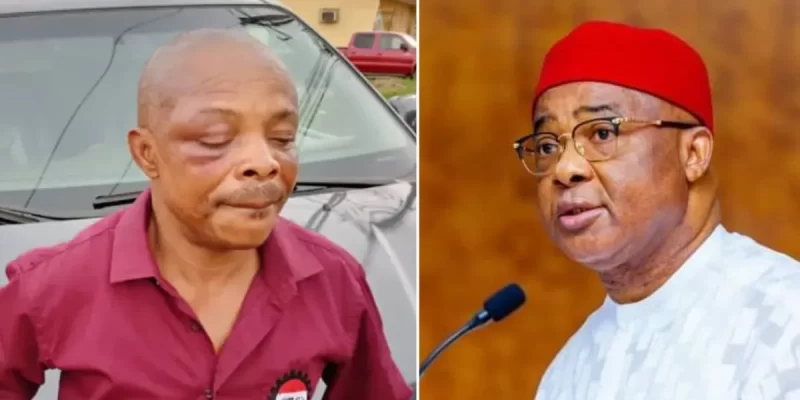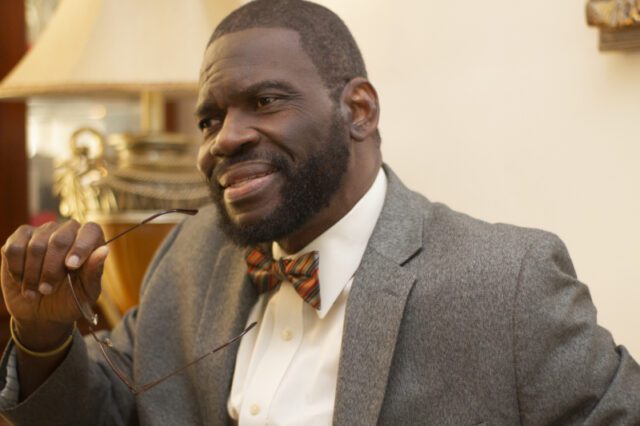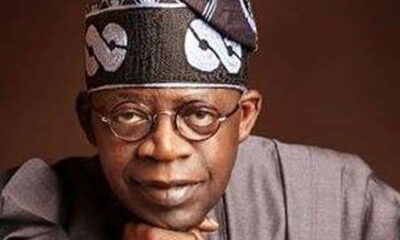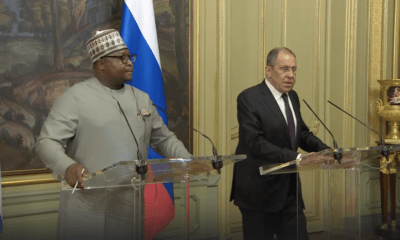Political Issues
Justice for Joe Ajaero – Why Governor Uzodimma, the Wrongdoer, Turning to Divine and International Justice Amid Weak Institutions? -By John Egbeazien Oshodi
To restore faith in democratic institutions, unwavering commitment is essential from the government, the honest media, and the people. A collective effort is needed to uphold the fundamental principles of democracy, ensuring the genuine voice of the people prevails and justice is delivered, free from political influence or compromise. Only through this unified dedication can democratic nations truly flourish and uphold the noble ideals upon which they were founded.

Seeking Justice Beyond Weak Institutions: Utilizing Old Testament, Quran, and African Traditions, International Sanctions to Overcome the Failures of Weak and Compromised Institutions in a System Marred by Injustice and Arbitrary Rule
Governor Hope Uzodimma’s reign in Imo State raises fundamental questions about justice, reverberating across the troubled landscape of the region. In their pursuit of justice for Joe Ajaero, President of the Nigeria Labour Congress (NLC), the people of Imo State are compelled to turn to age-old concepts of divine retribution and ancient traditions, seeking solace amidst the backdrop of weak institutions. Amidst the prevailing dishonesty in institutions, persistent institutional corruption, and inter-agency injustice, the echoes of sacred texts resonate with the oppressed, reminding them of their unyielding quest for justice, even in the face of compromised governance.
This exploration delves deep into the heart of societal suffering, revealing stark parallels between punitive measures outlined in revered texts such as The Old Testament, the Quran of Islam, and traditional African religious practices, and the very real agonies endured by the people under Governor Hope Uzodimma’s rule. Cloaked in frustration and despair, the cries for justice assume the weight of ancient pleas for divine intervention, capturing the collective yearning for solace and vindication amidst the unrelenting oppression.
As a psychologist witnessing pervasive frustration exacerbated by the erosion of faith in feeble institutions, I reflect on profound wisdom found in ancient religious texts, spanning the Old Testament, the Quran, and diverse African traditions. The contemporary landscape, tainted by compromised law enforcement, a judiciary mired in compromise, and institutions enfeebled by corruption, echoes the lamentations of ancient societies entrenched in injustice. Within this disheartening context, I advocate for ancient punitive approaches not as an endorsement of harm, but as a fervent plea for divine intervention—a desperate cry for justice in a society where the very foundations of the rule of law seem elusive. The voices of the oppressed, akin to echoes within sacred texts, resonate with a profound mix of despair and hope, beseeching a higher power to intercede and restore equilibrium where human institutions have woefully faltered. This enduring plea stands as a testament to the profound depth of people’s frustration and their yearning for a just and equitable society, where the vulnerable find protection, the wicked face accountability, and the echoes of ancient cries resonate in the collective pursuit of a brighter tomorrow.
In the sacred texts of The Old Testament, the Quran of Islam, and diverse African religious traditions, a profound language of wrathful retribution resonates. The plagues that befell Egypt, the famines that ravaged kingdoms, and the crumbling of societies under the weight of corruption were not mere allegories but stark representations of a higher power’s judgment. These biblical punishments find their chilling modern-day parallels in the afflictions suffered by the people of Imo State – the plague of political corruption, the famine of justice, and the collapse of societal harmony.
Within the boundaries of Imo State, the very institutions designed to safeguard the rights of citizens now stand compromised, their integrity corroded by moral decay. The vicious assault on Ajaero, a revered symbol of the collective labor force, stands as a chilling testament to the depths of moral degradation. The orchestrated brutality, allegedly sanctioned by the very entities entrusted with upholding justice, paints a grim picture of a society in decay. The people, their spirits battered but not broken, invoke the wrath of The Old Testament and the Quran of Islam’s specific harms as a desperate plea for retribution. Their cries, laden with anguish and hope, pierce the heavens, beseeching a higher power to unleash divine retribution upon the perpetrators of their suffering.
In the face of systemic injustice, the people’s cries echo the ancient supplications of biblical figures. They invoke the plagues as a metaphor for the corrupt practices that infest their society, the famines as a representation of their yearning for justice, and the collapse of kingdoms as a symbol of their hope for a new, just order. Their collective voice rises above the tumult, beseeching a higher power to intervene, to restore balance, and to usher in an era of fairness and righteousness.
Amidst the cacophony of discontent and the fervent yearning for justice, notable figures such as President Bola Ahmed Tinubu, Omoyele Sowore, a Nigerian human rights activist, and Femi Falana (SAN), a distinguished constitutional lawyer, have emerged as guiding lights in the intricate tapestry of Nigerian politics. Tinubu’s stance during the #ENDSARS protests left the public in a state of ambiguity. Initially, his support for the protests seemed tepid, raising questions about his commitment to the cause. As the protests gained momentum, his wavering allegiance further confounded the public, leading many to question his motives. In contrast, Sowore, the firebrand activist and journalist, emerged as a steadfast voice against oppression. His unyielding dedication to the plight of the people resonated deeply with the fervor of the protesters. Sowore’s courage in the face of adversity inspired hope, reminding the masses of the power of relentless activism.
In the intricate fabric of societal struggle, Femi Falana emerged as a beacon of hope for those yearning for justice. His profound legal expertise and unwavering dedication to human rights elevated him to the status of a symbol of resilience and integrity. Falana’s relentless efforts to hold the government accountable and his unwavering pursuit of justice for the oppressed injected a layer of complexity into the unfolding narrative. Amidst the murky waters of corrupt politics, the people found solace in Falana’s legal acumen, trusting him to champion their rights. These figures, with their diverse roles and contrasting positions, compelled the populace to critically assess their allegiances, urging them to differentiate genuine allies from mere political pawns. In a landscape rife with duplicity, the emergence of these figures underscored the intricate interplay of power, activism, and the unwavering spirit of the Nigerian people in their quest for a just society.
In the face of blatant injustice, it is imperative to cut through the complex web of deceit and demand accountability. Falana’s piercing questions echoed the doubts that gripped the nation: why did the police turn a blind eye to the assailants who attacked Ajaero right before their eyes? Why did they ignore the court’s order? Why do officials consistently seek out court orders to suppress peaceful protests instead of upholding democratic rights? Instead of resorting to a brutal assault, they should have allowed the legal system to handle the alleged contempt of court. These questions, laden with righteous indignation, reverberated across the nation, stirring a collective demand for truth and justice. As the labor unions stood united, presenting their demands to the federal government, one demand rang louder than the rest: the immediate removal of those responsible. This resounding call for accountability echoed through the nation, symbolizing the unwavering determination of the people to uphold justice and reclaim their rights.
In the face of public blunders, Nigerian authorities often resort to issuing misleading statements in an attempt to conceal their missteps. Unfortunately, the current national police chief is entrenched in this culture of systemic disease within the police force, casting a dark shadow over the entire law enforcement system. However, there remains a glimmer of hope that the national police commander will swiftly investigate and hold accountable those responsible for the brutal attack on the labor leader.
The stark contrast between Joe Ajaero’s account and the version presented by the Imo State Police Command, led by the Police Commissioner, raises troubling questions about deception, falsehoods, and inconsistencies within the law enforcement apparatus. This glaring disparity underscores the urgent necessity for a thorough and unbiased investigation, coupled with the immediate removal of the Police Commissioner. These incidents highlight the crucial need for law enforcement agencies to adopt ethical approaches and enforce stringent rules of engagement, adhering to both international standards and the national laws of Nigeria. Restoring public trust in law enforcement demands an unwavering commitment to truth, integrity, and the principles that protect the rights and dignity of every citizen.
The profound religious spirit inherent in African societies intertwines seamlessly with the struggle for justice and societal equity. In the face of oppression and the failings of weak institutions, many Africans turn to their faith, finding solace and guidance in the teachings of their respective religions. The Old Testament, the Quran of Islam, and diverse African religious traditions, with their narratives of divine retribution against the unjust, serve as wellsprings of inspiration and vindication for those enduring injustices. In moments of deep frustration, these ancient texts provide a glimmer of hope, portraying a time when oppressors faced divine wrath for their malevolence. It is within this context of profound religious conviction and the yearning for divine justice that the ancient punitive approach gains relevance. The stories of divine intervention against the wicked, while ancient, resonate deeply with the enduring faith of African communities, offering a semblance of retribution in a world plagued by corrupt leaders and compromised institutions. As a psychologist, the allure of these ancient beliefs becomes understandable, offering a semblance of control and accountability in the face of seemingly insurmountable challenges.
In the ongoing struggle, it’s crucial to acknowledge the timeless truth that power is ephemeral. Governor Uzodimma’s relentless pursuit of a second term, marked by desperate attempts to retain authority at any cost, mirrors the arrogance of fallen leaders throughout history. The ancient sacred texts, brimming with narratives of rulers facing divine retribution for their tyranny and injustice, serve as potent cautionary tales. Drawing wisdom from these age-old stories, the people unite in their unwavering demand for justice, reminding those in power that their reign is subject to the judgment of history and a higher force.
Simultaneously, the erosion of trust in democratic institutions after elections is a global concern, Nigeria being no exception. The compromise of the Independent National Electoral Commission (INEC), originally established to uphold democratic ideals, has stained these principles. Post-election periods, once symbols of peaceful transitions and the people’s voice, now witness legal battles. Dissatisfied contenders often seek justice in courts, yet a compromised judiciary undermines fairness and impartiality. In a robust democracy, judges are entrusted with interpreting the law objectively. However, when their decisions are influenced by political or extraneous factors, the credibility of the entire legal system is jeopardized.
Addressing these challenges necessitates fortifying democratic institutions, ensuring transparent electoral processes, and empowering an impartial judiciary. Adherence to international standards in election monitoring provides invaluable insights, while educating citizens about their rights and the importance of holding leaders accountable fosters an informed and engaged electorate. Through these concerted efforts, a foundation for a just and resilient democracy can be laid, transcending current limitations and paving the way for a brighter future.
The erosion of trust in institutions like INEC and the judiciary has severe consequences, fostering disillusionment among voters. When mechanisms for justice and fairness are tainted by corruption or political interference, citizens lose faith in the democratic process itself. Addressing this crisis requires comprehensive reforms: strengthening institutional independence, ensuring transparent elections, and empowering an impartial judiciary are vital steps. International election monitoring standards offer valuable insights, and educating citizens about their rights and the democratic process can cultivate an informed and engaged electorate.
To restore faith in democratic institutions, unwavering commitment is essential from the government, the honest media, and the people. A collective effort is needed to uphold the fundamental principles of democracy, ensuring the genuine voice of the people prevails and justice is delivered, free from political influence or compromise. Only through this unified dedication can democratic nations truly flourish and uphold the noble ideals upon which they were founded.
In the annals of religious texts like the Old Testament, the Quran of Islam, and traditional African religions, a plethora of punishments were stipulated for various transgressions, reflecting the societal norms and values of their respective eras. From banishment to afflictions and other severe penalties, these ancient scriptures detailed a range of punitive measures. As contemporary society in Imo State grapples with mounting frustration and disillusionment, a pivotal question emerges, haunting the collective consciousness: Should the stringent punitive measures outlined in ancient scriptures, including banishment and afflictions, be regarded as a legitimate recourse in the pursuit of justice? Amidst the pervasive frustration exacerbated by the frailty of compromised institutions, individuals, including this psychologist, find themselves contemplating unconventional avenues to address entrenched societal issues. Delving into the depths of religious doctrines, they seek refuge in the idea of divine intervention, drawing parallels between the injustices of today and the age-old narratives of divine retribution. This profound question resonates not merely as an inquiry but as a fervent plea for resolution to the rampant injustices afflicting Imo State and, by extension, the entire nation of Nigeria.
The weakness and compromise of institutions in Nigeria have created a breeding ground for corruption, injustice, and the violation of human rights. In the face of these dire circumstances, advanced societies must step forward as beacons of justice and morality. Enforcing travel bans and freezing assets of leaders involved in such atrocities would not only curb their influence but also demonstrate a resolute testament to upholding universal values. These actions would resonate as a stern warning to oppressive leaders worldwide, reminding them that their actions will not go unnoticed or unpunished. As the international community unites against tyranny, the plight of the oppressed in places like Imo State gains global significance. It underscores the collective resolve to stand up against injustice and safeguard the basic rights and dignity of every individual, regardless of their location or circumstance. In this unified effort, the world sends a powerful message: the pursuit of justice knows no borders, and those who trample upon human rights will face consequences that reverberate across the global stage.
In the wake of unrelenting injustice and the cries for divine retribution, the plight of Joe Ajaero and the people of Imo State stand as a haunting testament to the shattered foundations of justice and the weakening institutions in the face of Governor Hope Uzodimma’s reign. The utilization of ancient texts from the Old Testament, the Quran of Islam, and diverse African religious traditions serves as a powerful reminder of the punitive measures that have echoed through history. Amidst the cries for justice, a bitter irony lingers in the air—Governor Hope Uzodimma, ironically named “Hope,” has not bestowed hope upon the people but instead enforced police brutality and suppressed their rightful protests. In the face of this grim reality, the call for justice remains undeterred, echoing through the corridors of power, demanding accountability, and yearning for a society where the cries for justice are met with genuine hope and unwavering fairness.

John Egbeazien Oshodi
Professor John Egbeazien Oshodi, who was born in Uromi, Edo State, Nigeria, to a father who served in the Nigeria police for 37 years, is an American-based police and prison scientist and forensic, clinical, and legal psychologist. A sex offender assessment and treatment psychologist. A government consultant on matters of forensic-clinical psychological services in the USA; and a former interim associate dean and assistant professor at Broward College, Florida. The Founder of the Dr. John Egbeazien Oshodi Foundation, Center for Psychological Health and Behavioral Change in African Settings. In 2011, he introduced state-of-the-art forensic psychology into Nigeria through N.U.C. and Nasarawa State University, where he served in the Department of Psychology as an Associate Professor. He has taught at various universities and colleges including Florida memorial University, Florida International University, Broward college, Lynn University, and a contributing faculty member at the Weldios university in Benin Republic, Nexus International University, Uganda, Nova Southeastern University and Walden University in USA. He is a Human Rights Psychologist with a focus on African related environments. john.oshodi@mail.waldenu.edu

















